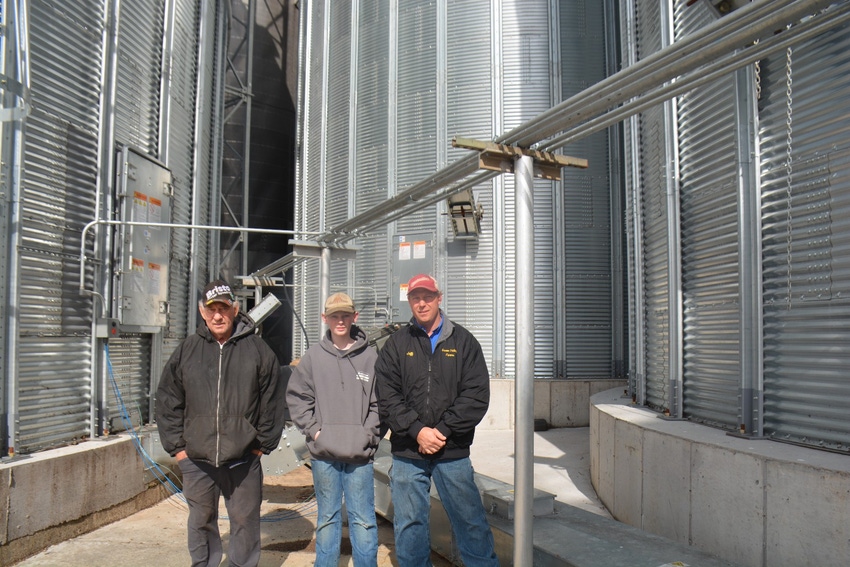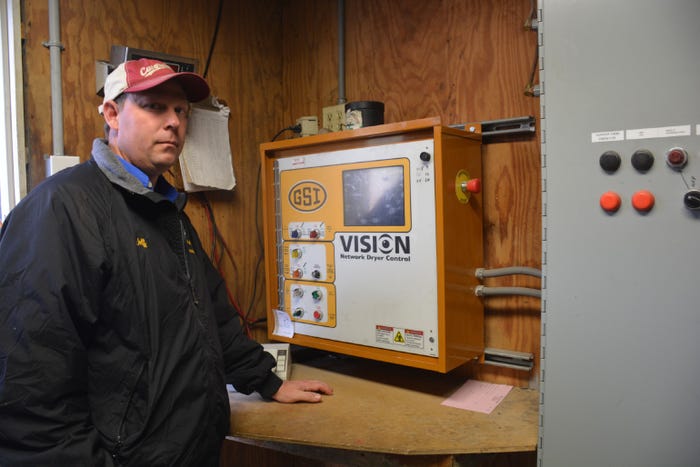
To understand the weather challenges of growing crops in the Blacklands of North Carolina, the story of both a hurricane and tornado that did in the grain facility of Green Valley Farms near Columbia in Tyrell County fits the bill perfectly.
Green Valley Farms is owned and managed by Jeff Sparks and his dad, Donald Sparks. The family produces 6,000 acres of corn, soybeans, and wheat in the heart of the North Carolina Blacklands, an area known for both its dark productive soils and multitude of weather challenges being so close to the coast.
On Sept. 5, 2019, Hurricane Dorian came in and destroyed the 11,000-bushel wet storage tank on the farm. “Fortunately, our corn harvest was finished. We finished corn harvest the day before Hurricane Dorian came through. All we had to do was dry soybeans. We salvaged part of the bin to dry soybeans,” Sparks says.
Then, almost exactly five months later, on Feb. 6, 2020, a severe weather system impacted much of North Carolina, spawning tornadoes. At the time, Sparks was attending the Southern Farm Show at the State Fairgrounds in Raleigh.
“We were at the show and were told to take shelter in the Graham Building,” Sparks recalls. The tornadoes didn’t impact the State Fairgrounds in Raleigh, but back home in Columbia, it was a different story
Bin strewn across highway
A major tornado had rolled in, wiping out most of the rest of the grain bin, leaving just one grain leg and one loadout tank. Sparks returned to the farm to find much of his grain facility strewn across Highway 94. The tornado had destroyed most of it.
Fortunately, other farm buildings were untouched and both Jeff’s home and his dad’s homes weren’t impacted, since they both live a few miles from the farm. The family also got a break because the grain bin was empty with all the contents moved out of storage two weeks before the tornado hit.
Sparks immediately went to work to rebuild the system with the goal of having it up and running come harvest. He worked with his insurance company and turned to his GSI dealer, Steven C. Hill Millwright Service who immediately stepped up to rebuild the system for the farm. Needless to say, there were complications along the way.
Come March, everything pretty much shutdown across the country because of the pandemic. On top of that, dealing with the insurance company on such a large claim is always a daunting task. But through it all, Sparks says Hill was cooperative and helpful every step of the way. Hill worked to design and install a system that outperformed the system destroyed by Hurricane Dorian and the Feb. 6, 2020 tornado.
“We got all of orders in by the end of February. GSI really stepped up to the plate and Steve did a fantastic job of getting everything here in a timely manner and getting us back going, despite the pandemic that complicated things,” Sparks says.
Goal: Ready by harvest
Despite all the challenges, Hill and his team began construction with the goal of having the grain facility up and functioning in time for the fall corn and soybean harvest. There were delays and setbacks, but the project did go forward and Hill was committed to helping reach the goal to be done in time for harvest.
The family decided to redo the foundation of the facility since it was cracked and jeopardized. The concrete work stared in April and rains in May delayed the foundation work. Concrete was poured and the foundation was laid the first week of June with the first grain bin going up June 4. Other foundations were completed by the middle of June and by July 4, the three other bins went up.
“By the end of July and first of August, the elevators were up, and we had electricity. Steve really stepped up to the plate to get us up and running. We were able to run grain in it on Sept. 28,” Sparks says.
Normally, Sparks and his dad start their corn harvest the first week in August. But wet weather and cool temperatures delayed the beginning of harvest until the end of August. The delay actually benefited the family because the grain facility still wasn’t complete.
The family did make improvements to the system. The new system has four dry storage bins — three with 45,000-bushel capacity and one with 100,000-bushel capacity. It has a new 20,000-bushel wet storage bin. It has three new grain legs and three drags. They were able to repair the damage to the existing dryer, so they did not have to replace that.
In addition, the family decided to raise the concrete foundation and turned to a concrete floor for the bins. They also installed air tunnels to improve air flow which makes it easier to clean and brings less problems under the bin floor, such as weevils and bugs.
The old system had three 33,000-bushel bins. Sparks said the extra capacity was needed. “If you count the wet storage and load out tank, we have just a shade over a quarter million bushels of storage right now,” he adds.

About the Author(s)
You May Also Like






